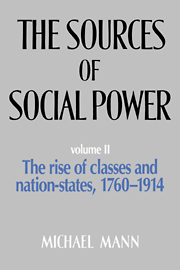Book contents
- Frontmatter
- Contents
- Preface
- 1 Introduction
- 2 Economic and ideological power relations
- 3 A theory of the modern state
- 4 The Industrial Revolution and old regime liberalism in Britain, 1760–1880
- 5 The American Revolution and the institutionalization of confederal capitalist liberalism
- 6 The French Revolution and the bourgeois nation
- 7 Conclusion to Chapters 4–6: The emergence of classes and nations
- 8 Geopolitics and international capitalism
- 9 Struggle over Germany: I. Prussia and authoritarian national capitalism
- 10 Struggle over Germany: II. Austria and confederal representation
- 11 The rise of the modern state: I. Quantitative data
- 12 The rise of the modern state: II. The autonomy of military power
- 13 The rise of the modern state: III. Bureaucratization
- 14 The rise of the modern state: IV. The expansion of civilian scope
- 15 The resistible rise of the British working class, 1815–1880
- 16 The middle-class nation
- 17 Class struggle in the Second Industrial Revolution, 1880–1914: I. Great Britain
- 18 Class struggle in the Second Industrial Revolution, 1880–1914: II. Comparative analysis of working-class movements
- 19 Class struggle in the Second Industrial Revolution, 1880–1914: III. The peasantry
- 20 Theoretical conclusions: Classes, states, nations, and the sources of social power
- 21 Empirical culmination – over the top: Geopolitics, class struggle, and World War I
- Appendix: Additional tables on state finances and state employment
- Index
16 - The middle-class nation
Published online by Cambridge University Press: 04 August 2010
- Frontmatter
- Contents
- Preface
- 1 Introduction
- 2 Economic and ideological power relations
- 3 A theory of the modern state
- 4 The Industrial Revolution and old regime liberalism in Britain, 1760–1880
- 5 The American Revolution and the institutionalization of confederal capitalist liberalism
- 6 The French Revolution and the bourgeois nation
- 7 Conclusion to Chapters 4–6: The emergence of classes and nations
- 8 Geopolitics and international capitalism
- 9 Struggle over Germany: I. Prussia and authoritarian national capitalism
- 10 Struggle over Germany: II. Austria and confederal representation
- 11 The rise of the modern state: I. Quantitative data
- 12 The rise of the modern state: II. The autonomy of military power
- 13 The rise of the modern state: III. Bureaucratization
- 14 The rise of the modern state: IV. The expansion of civilian scope
- 15 The resistible rise of the British working class, 1815–1880
- 16 The middle-class nation
- 17 Class struggle in the Second Industrial Revolution, 1880–1914: I. Great Britain
- 18 Class struggle in the Second Industrial Revolution, 1880–1914: II. Comparative analysis of working-class movements
- 19 Class struggle in the Second Industrial Revolution, 1880–1914: III. The peasantry
- 20 Theoretical conclusions: Classes, states, nations, and the sources of social power
- 21 Empirical culmination – over the top: Geopolitics, class struggle, and World War I
- Appendix: Additional tables on state finances and state employment
- Index
Summary
Theoretical issues
Chapters 4 and 9 discuss nineteenth-century regimes essentially composed of only a few thousand families. They could not rule unaided. True, workers provided little organized threat until the end of the century; peasants organized earlier but (as Chapter 19 shows) rarely subversively. It did not matter greatly whether most workers were enthusiasts for king, country, and capital or were disaffected. As they had few stable power organizations, their beliefs were largely irrelevant. Organizational outflanking, however, requires lower-level administrators and loyalists, formerly provided by particularistic segmental networks now somewhat reduced by the universalism of capitalism and modern state. Yet comfort emerged after midcentury from a group of predominantly loyal subalterns, the middle class.
Since then, this class has been mostly loyal to capitalism. Regimes seemingly have worried most about what many writers have believed to be its intermittent tendency to nationalist extremism. I shall look at bourgeois nationalism rather skeptically, finding a much more particularistic social location for what I term an overzealous, superloyal statism. Given such long-lived class loyalty, this chapter often breaks chronological boundaries, generalizing about continuities (where they exist) right up to today. The middle-class nation-state created in the late nineteenth century proved, in crucial respects, to be ours. The middle class has been as important as the working class in shaping Western society.
Defining of the middle class has always been contentious. The rise of “middling groups” immediately presented conceptual problems for nineteenth-century observers.
- Type
- Chapter
- Information
- The Sources of Social Power , pp. 546 - 596Publisher: Cambridge University PressPrint publication year: 1993



